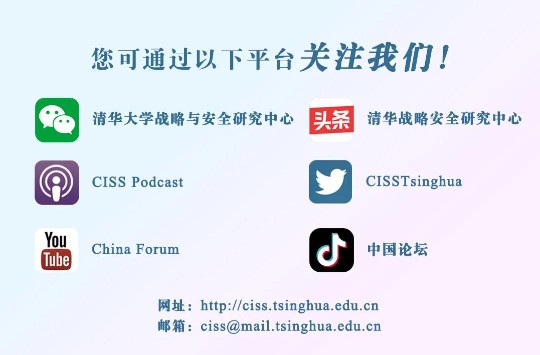编者按
中国论坛特约专家、国务院发展研究中心世界发展研究所研究员丁一凡教授,日前在中美聚焦网站发表英文评论“China on Global Team”。
丁一凡认为,中国坚定支持联合国维和与发展项目、主张并接受多边机构的协调和裁决、积极寻求多边组织框架下的多国合作和行动,证实了中国一直是多边主义的忠实践行者,为联合国的多边事业和全球治理作出了杰出贡献。清华大学战略与安全研究中心转发此文,以飨读者。
China on Global Team
By Ding Yifan
China's recent decision to join the WHO's vaccine implementation plan against the coronavirus has attracted great attention from the international media. As a country with a high level of COVID vaccine research, China has developed four vaccines that have entered phase III clinical trials. China has sufficient production capacity and is self-sufficient in vaccines, so it decided to join the implementation plan initiated by the WHO and the Global Alliance for Vaccines and Immunization. The decision aims to promote the equitable global distribution of vaccines, to ensure that developing countries have access and to encourage more capable countries to join and support the plan.
China has vaccinated a total of around 60,000 people, with no reports of serious adverse reactions so far. Chinese people who work in high-risk areas have not reported infections after being vaccinated. China's decision has undoubtedly boosted global confidence in the smooth progress of the implementation plan.
In fact, the country's decision is in line with the its commitment to international multilateral cooperation, a path it has been advocating for a long time.
China insists that global multilateral organizations represented by the United Nations must play a major role in global security and the governance of development agendas. It also insists on participating in the construction and cooperation of other regional multilateral organizations. In recent years, it has made many contributions to the global governance framework of multilateralism, mainly in four respects.
First, China continues to make contributions to UN peacekeeping and development projects. International organizations represented by the UN are typically multilateral and form the foundation for maintaining world peace and development. As a permanent member of the United Nations Security Council, China has made active contributions to the peacekeeping activities supported by the UN, and is the permanent member of the Security Council that has contributed the most to those efforts.
China was once a beneficiary of development assistance from the multilateral institutions of the UN system, and has received preferential loans from the World Bank. Now, it provides substantial financial aid to UN agencies to help them achieve their goals of assisting development, helping developing countries alleviate poverty and realizing basic education. During the coronavirus pandemic, China has provided $20 million to the World Health Organization to help the WHO better organize epidemic prevention and anti-epidemic activities.
Second, China advocates and accepts coordination and rulings from multilateral institutions. Multilateral institutions represented by the United Nations generally formulate clear rules and define guidelines for action that are compatible with common interests. For example, the purposes and principles of the United Nations Charter are fundamental in the handling of international relations under the UN framework. The charter supports the principle of sovereignty and the equality of all member states, and the UN's systems and rules require coordinating the interests of all countries.
All member states, large and small, should be defenders of international rules and the rule of law. In multilateral organizations, not every decision is in line with China's interests or expectations, but China still supports the decision-making process of those organizations and respects them, such as the rulings of the World Trade Organization.
Of course, some countries have tried to force China into a multinational arbitration against the reality of its historic heritage, which is a violation of international law. China is firmly against this sort of maneuver.
Third, China is actively seeking cooperation with other member states within the framework of multilateral organizations through consultations to resolve conflicts and jointly promoting the realization of the universal goals of development and peace. Different countries have different national conditions, different natural endowments, differing stages of development and different requirements. It is normal that they sometimes have diverging opinions. However, as long as the member states of a multilateral organization insist on openness and tolerance and strengthen their coordination and cooperation, differences can be effectively resolved and common interests can be maximized.
In this regard, China is willing to cooperate with partners in other multilateral organizations. It will adhere to the values of Chinese philosophy — seeking common ground while reserving differences. Together with other members, China will jointly promote the consultation and negotiation functions of those institutions. In addition, China has actively participated in the establishment and operation of new multilateral institutions, including the Asian Infrastructure Investment Bank, the BRICS Bank and others.
Fourth, China actively promotes action within multilateral organizations and takes practical steps to implement goals within the framework of multilateral cooperation. The realization of vision and goals depends on joint action, problem solving and substantive results. Important international multilateral governance institutions have provided participants with a platform for dialogue and negotiation. Recently, because of the pandemic, the World Health Organization called on its members to cooperate in anti-epidemic moves globally, something that received strong support from China.
China suggests that multilateral organizations give development issues high priority and pay more attention to promoting and protecting the people's right to live and prosper, including the right to live in harmony with nature.
In 2015, at the summits on the 70th anniversary of the founding of the United Nations, President Xi Jinping announced the establishment of a China-United Nations Peace and Development Fund to support the multilateral undertakings of the UN. Over the past few years, the fund has sponsored dozens of projects carried out by UN departments.
UN Secretary-General Antonio Guterres spoke highly of the partnership between China and the UN, saying that "China is the most important pillar of multilateralism" and that China "is actively participating in global development cooperation, and working with the international community to explore global governance mechanisms to solve global challenges."
Ding Yifan: China Forum expert, Deputy Director of China Development Research Center
本文首发于中美聚焦网站

